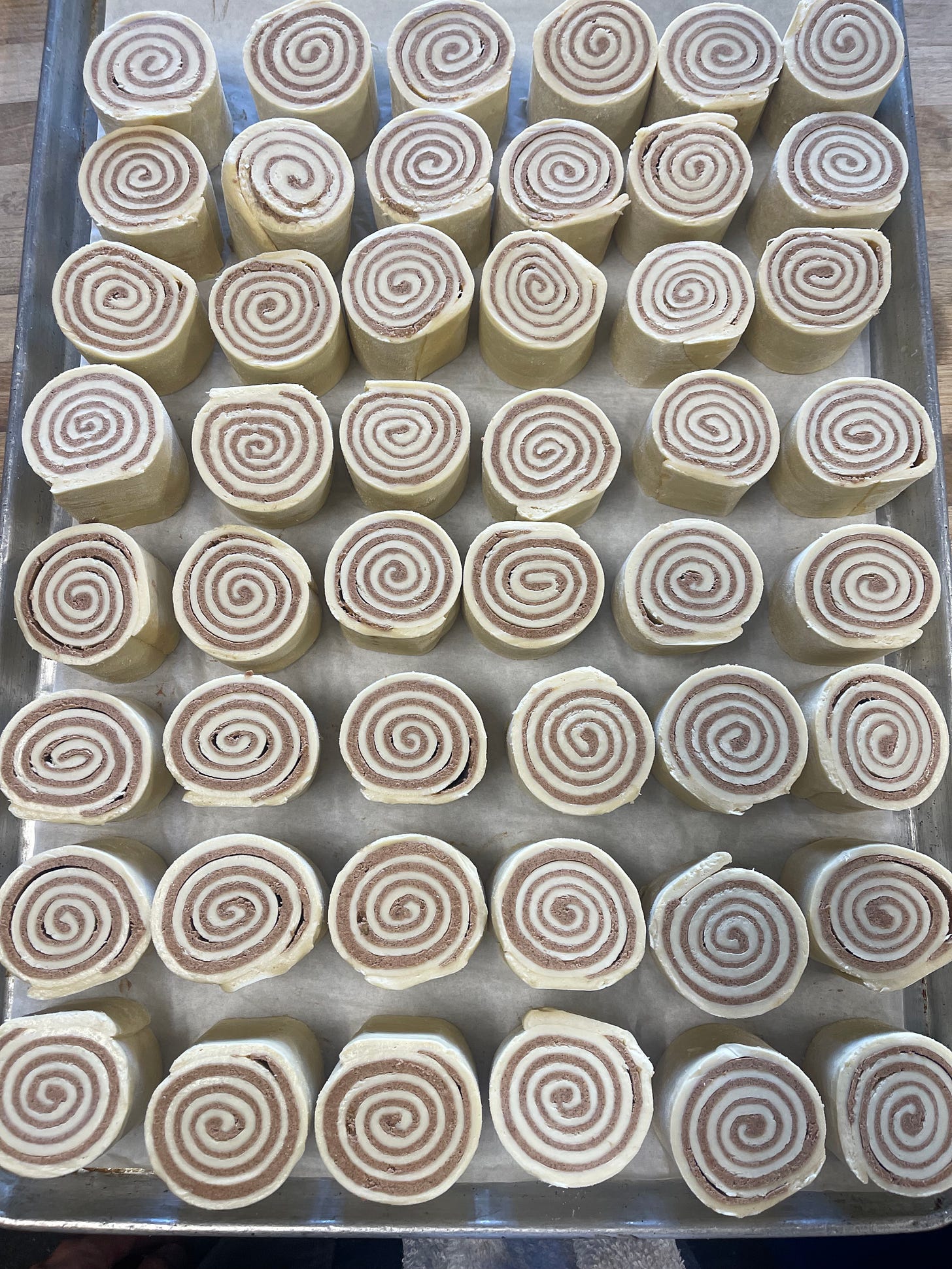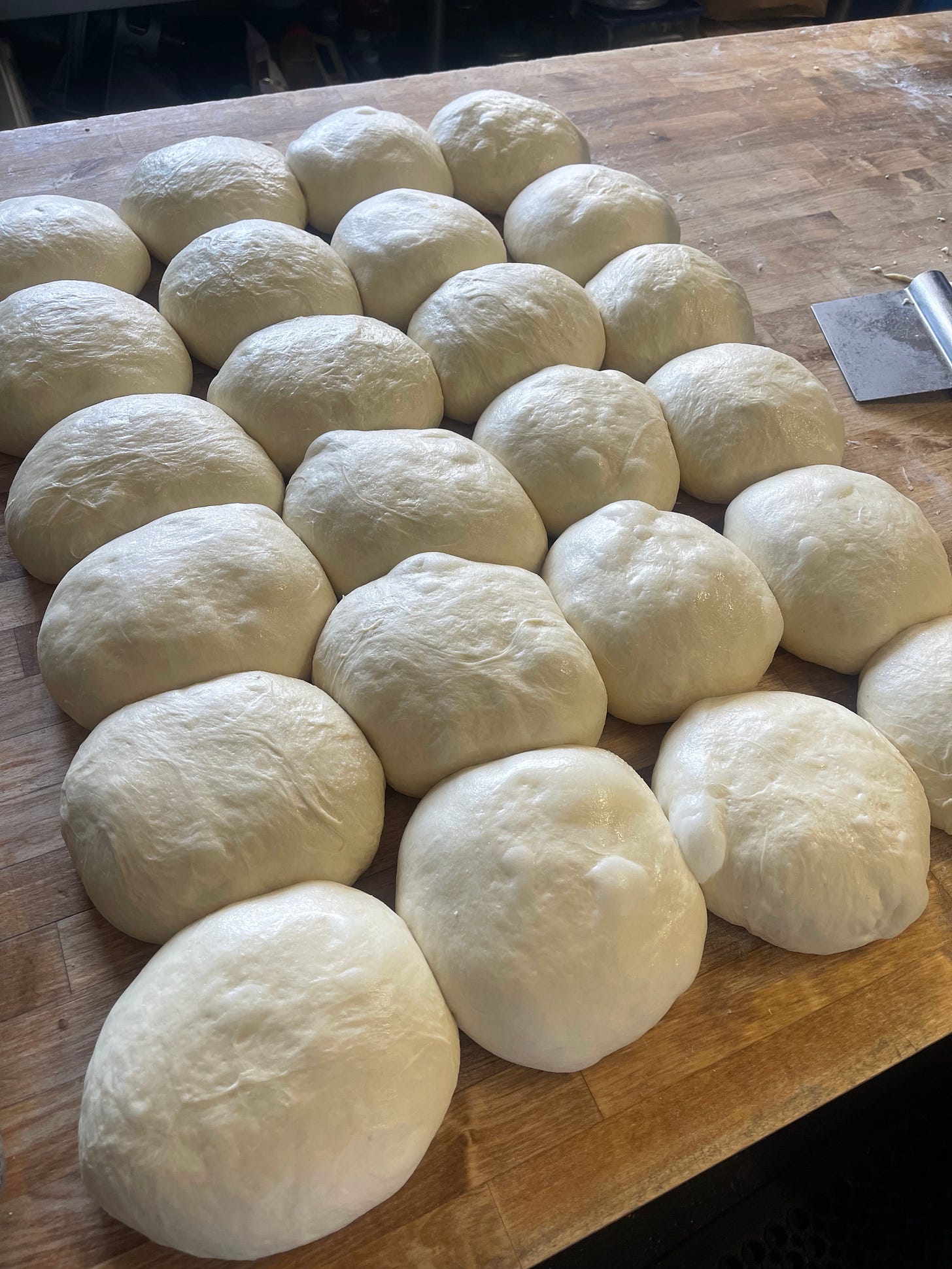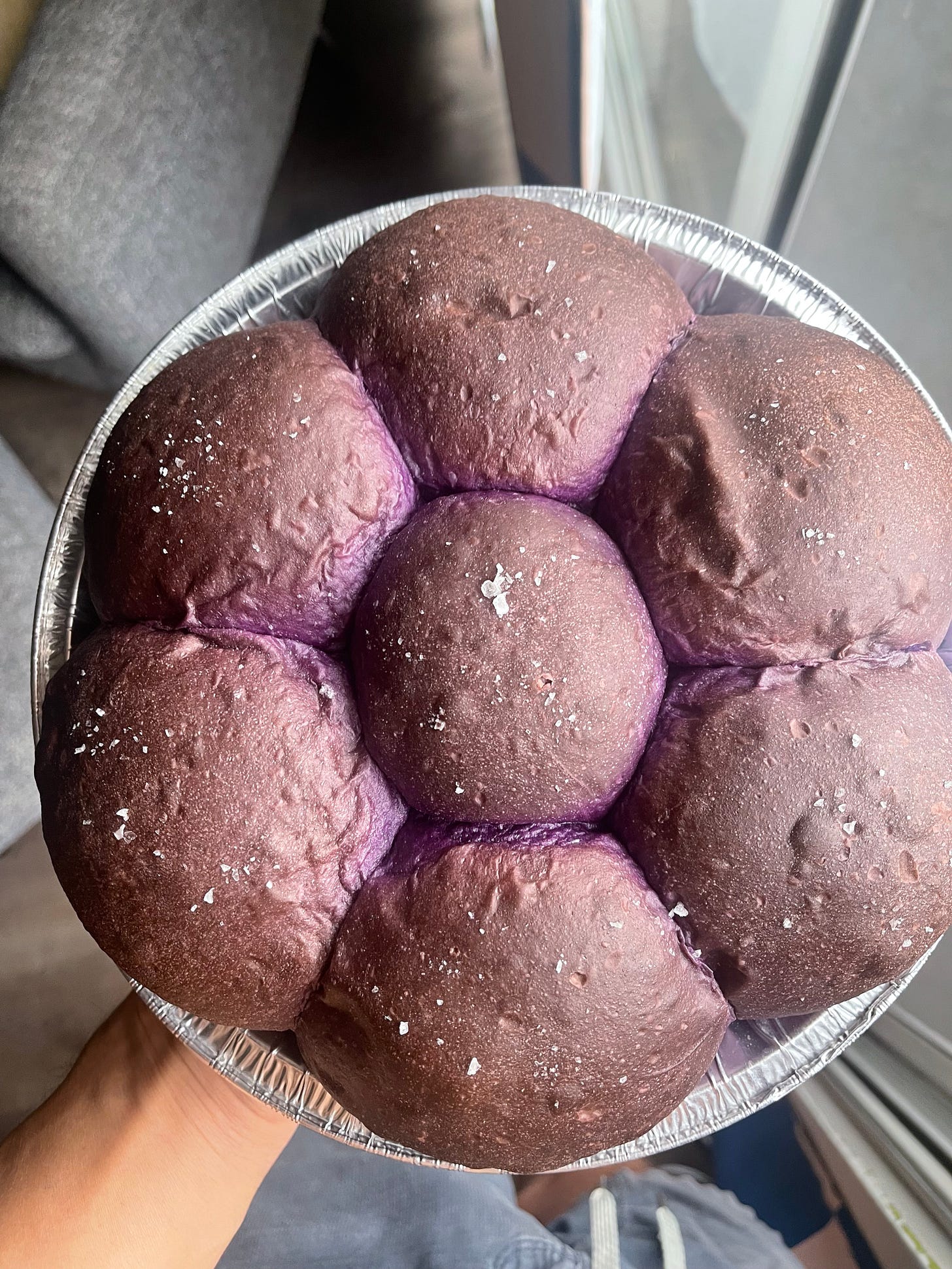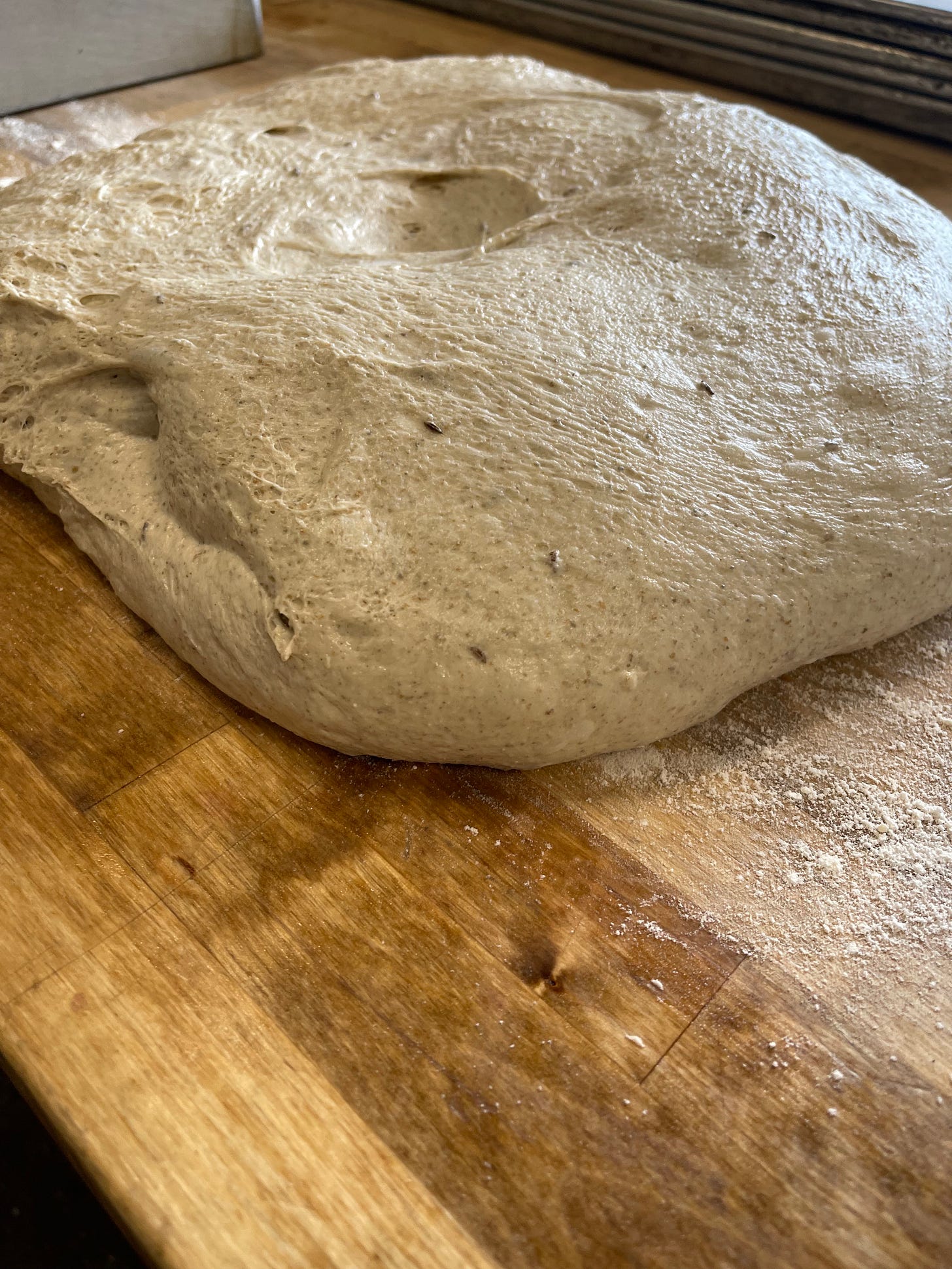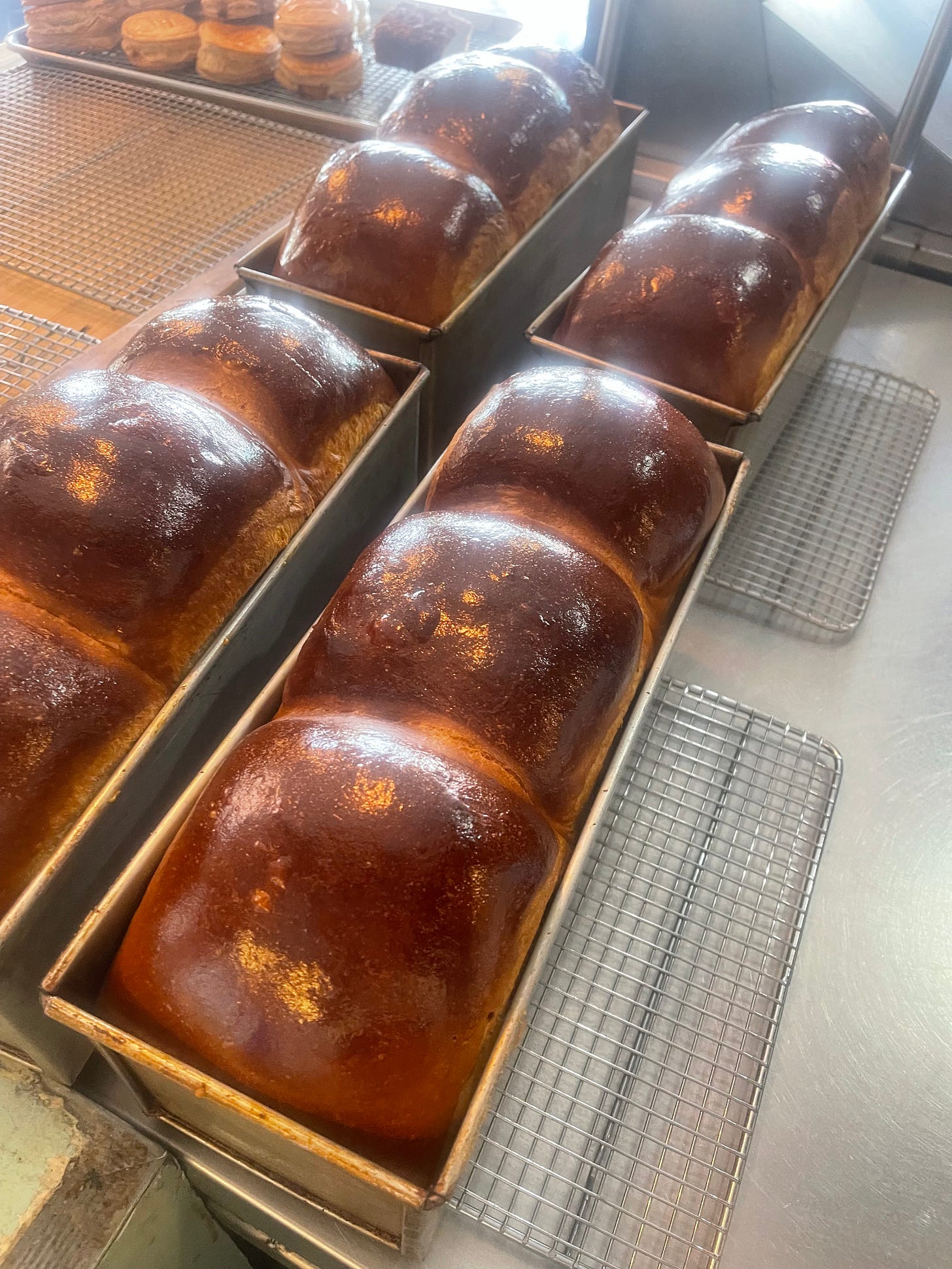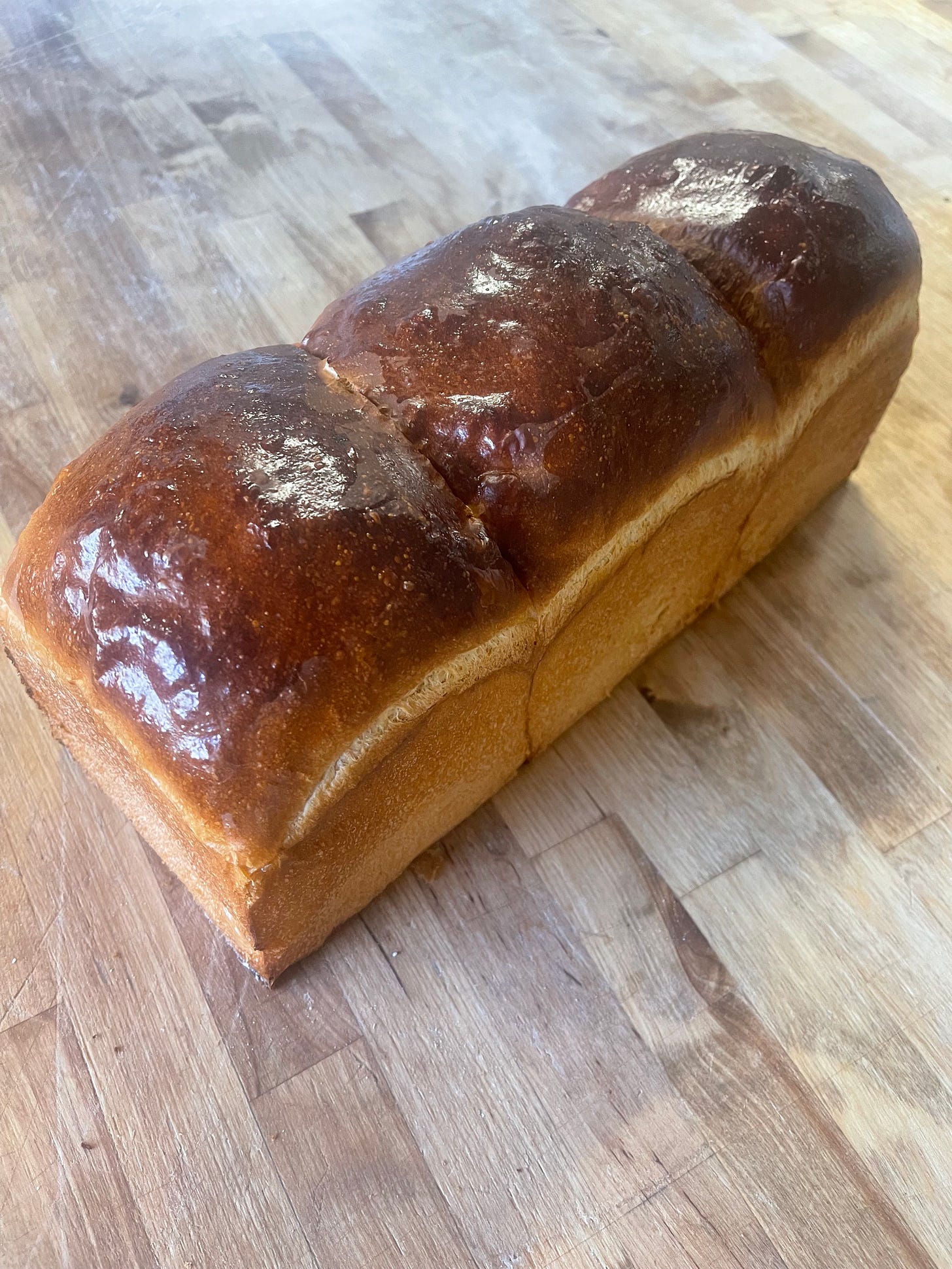My partner and I were eating breakfast at our favorite bakery when the owners plopped down with a reporter at the table across from us. They hunched over and leaned in close, priming themselves to speak into the reporter’s digital recorder. With little preamble they launched into a lecture on their many sage learnings of the sacred craft of sourdough. I never read the article, but I imagine it reads more like a dissertation on agrarian permaculture than a writeup on a local cafe. Featuring such soundbites as- Organic whole grain properties manifest themselves differently than what most bakers come to expect from commercial flour. And- It begins with recognizing which environmental factors you can control and which you can’t.
Their tone? Severe. Their crust? Well baked, NOT BURNT. In a conversation full of gems I’ll never forget when one of the owners, deadly serious, said-
‘Sourdough doesn’t care about what you’ve got going on in your life. You can’t schedule making bread around your life and expect to make good bread. If you want to make good bread you’ve gotta schedule your life around it.
Amen brother.
For the absurdity of the notion that slinging flour and water together constitutes a religious ritual, I’d happily take it in place of the Abrahamic trifecta of guilt. It’s not the water to wine or eight days and nights I’d been taught, but it’s definitely the closest to magic you can get. I mean, what the fuck do you mean you can grind up wheat seed, mix it up with some water and salt, bake that shit, and now you’ve got the sustenance of life? That’s fairytale nonsense.
Doubtful I’d add to the Robertson/Silverton takes that already exist on the ephemeral quality of making sourdough. Plenty of well trodden explorations exist on human obsession and the chase for perfection, but still, it’s odd to think after thousands of years after its establishment as the bedrock of society we rediscovered our collective reverie for bread in the mid aughts. I can’t speak with the anthropological focus of the baking elite, but I’ve seen the new age explosion of grain fixation first hand. (Not like it’s a flex, everyone has instagram, we all saw the loaves, right?) From the post-Tartine exodus out of San Francisco, to the subsequent epidemic of sourdough operations materializing up and down the coast, until, finally, the daily loaf making hobbyist (or even cottage bakery operation) frenzy of the covid era, it felt like I woke up one day and everyone had an opinion about bread.
I guess this is a generally positive development. I wasn’t an avid baker growing up, but I was eventually indoctrinated into the kitchen when I took up an obsession with sourdough at 23. I basically appreciate that it’s a craft that people have garnered an acute recognition of akin to winos or bbq aficionados, even if it is annoying to listen to the pitter patter of exchanges about ‘inoculation,’ ‘hydration levels,’ and ‘ph balance.’
Most annoying, at least in my opinion, is the cottage-ification of bread in the public imagination through hordes of clickbait-y angelic homesteaders hiding out on idyllic pastures, dawning their pressed floral aprons and breaking out their frontier era kitchen tools. Hard to tell if these videos and their makers are actually trying come across as authentic or if it’s part of some larger trad-wife psyop campaign.
The bizarre cultural undertone of ‘the way things used to be’ undercuts the facade of milky white bread maidens who awaken in the early dawn hours to face their mid-century ovens all while comprehensively documenting their efforts for the doomscrolling public. Yes, these proud traditionalists actually thrive on this highly impractical ritual itself as its own form of gratification.
But contrary to what the zuckerverse might have you think, the reality of the situation is some Mexican dude name Juan probably made that ciabatta you’ve got in your hand.
It’s even more likely that baker baked that bread in a kitchen full of other latin comrades who most likely all woke up hundreds of miles away from families back at home in countries all over Latin America. And the single loaf that makes it to your pantry every week represents just one of thousands they handle mixing, shaping, and baking week after week after week.
Hard to find this information in the margins of the Tartine bible.
To anyone with a pulse it’s pretty easy to see who the backbone of ANY kitchen is. Anyone stupid enough to present America as a post-segregation society need only look at the back of house. I’ve only spent a small fraction of my life in ‘professional’ kitchens, but during my tenure I’m not sure I’ve ever once seen a white person clean the grease traps over the oven. I’ve definitely never seen a white person vacuum the vents on the reach ins with a shop vac. And while I’ve had many a comrade who responsibly clears the dish pit from time to time (you know who you are), I’ve never met a full time dishwasher who wasn’t latin either. The whole infrastructural foundation of the kitchen is manned by latin people. (Pin the Bourdain quote here.)
I’m not dense enough to think that there aren’t reasons for this. Systematic reasons, practical reasons, geographical reasons, garden variety racism reasons. The barriers of culture and language can make for a logistically complicated work environment, but less discussed is the massive divisions that form based on the gap in work ethic from cook to cook. Latin cooks, whether it’s by nature or nurture, simply work harder than other cooks. I can’t prove this. I don’t have a chart and I’m not planning on touting any department of labor data, but it’s been the case in every back of house I’ve ever set foot in.
Bread is an easy litmus test. The hours in commercial bread kitchens are grueling- often work begins at 4AM, sometimes even as early as 2AM (or even the dreaded midnight graveyard start). The physical tasks required for bread making (portioning, shaping, schlepping) involve engaging your whole body in a way that can’t really be phoned in. Inevitably some part of your shoulder, hips, lower back, neck, and knees hurt from repetitive movement. I promise there is nothing romantic about the feeling of freezing wet dough against dry chapped hands first thing in the morning.
The physical aspects are challenging enough, but it’s often discounted how mentally demanding it is to keep a uniform, reliable product. There’s a certain level of focus required to zip through 100 portions of bagels, donuts, rolls, buns. Tracking the rise of sourdough over the span of days requires even more foresight. A talented baker/chef I know once told me why he doesn’t have any interest in making sourdough these days-
‘That shit takes over your whole mind.’
Anyone who attempts a loaf of sourdough is immediately confronted with the logistical challenges of the process. Conservatively, it’s a 48 hour commitment. From mix to consumption you could possibly sink 60 plus hours into a single bake. All that for one basic country style boule. The starter maintenance alone is a pain in the ass (if you’re doing it right at least). While there are plenty of home bakers who have locked in on the routine of making a loaf a week, I can assure you the complications expand exponentially as soon as that number begins to scale up to 12, 20, 200 loaves a day.
So who handles the brunt of that work? Overwhelmingly, latin people are essential in the production of bread. To say ‘well there’s bakers of every color!’ or ‘my old pastry chef was white!’ even ‘I’m asian and I work 60 hours a week and start every work day at the crack of dawn!’ misses the point. Chad Robertson is one of the most famous sourdough bakers in the world, but you’re not going to see him manning the ovens at the manufactory during the 2 am bake 6 mornings a week (not to say he hasn’t logged his fair share of hours in front of the oven). Because making a single loaf might be art, but making a hundred is labor. It’s taxing. It’s repetitive. It’s insulating. It’s fucking hard.
So why latin people? It would clearly be reductive to assign attributes to 700 million people- to say they are all generally one way because of these reasons. Even ‘good’ stereotypes are still stereotypes, and it would be infantilizing (and false!) to paint every latin cook as some tireless workhorse with machine like ability and no preoccupations outside of the kitchen. I think at the end of the day, at least in America, we’ve simply come to expect latin people to do these jobs. To work in front of the oven, or under the sun, or out in the construction yard. Again, I have no reliable data to prove this, but I can recount plenty of times a white coworker, friend, or family member have said something flippant about ‘hiring some Mexicans’ to put up a gate, cut back some trees, or some other shorthand about a quick cheap solution to a taxing physical task.
I’m not trying to say every non-latin person working at a bakery is racist, but it’s sort of pointless to discuss where anyone personally sits on the bigot spectrum when the system is set up within racist parameters. This notion that latin people are specifically delegated to the most physically taxing roles in the kitchen undercuts their intimate knowledge of food as a craft. What would happen if we reframed our mindset around bakers away from simply being labor, and began recognizing them as artisans, technicians, skilled workers? How would kitchens change? How would labor dynamics shift?
I think about Nathan Myhrvoid’s deification in food media. The little pudgy CTO Epstein fave turned mad-scientist chef that seems to constantly appear on cooking shows, documentaries, and in exhaustive magazine features on his contribution to the field of gastronomy. ‘Genius’ he may be, but I severely doubt his credentials as a baker. Sure, he might be able to give a comprehensive lecture about chemical reactions that occur during the autolyse phase, does he know the physical toll of bread production 300 days a year? Would he have it in him to bang out the shape the day before Thanksgiving? Has he ever actually experienced the physical toll of a standard day of bakery production? In some ways, if he doesn’t, why the fuck should I care about him and all his expertise in molecular bread science?
This might seem antithetical to this whole tirade, but this is not about latin people exclusively. The global south is much more diverse than the workers of latin America. There are diasporas of workers from every country in the world exposed to a variety of capitalist abuses, but domestically, in our home of the free-market, Latin people hold a special place in the US oligarchy’s new favorite subjugation fixation. Lately, the timeless practice of class domination manifests itself in masked goons bagging brown men on the streets and throwing them into the back of unmarked vans to be whisked away to some camp in the swamp.
Even without the modern DHS shitshow flexing their bloated coffers with every car wash raid or clandestine taco stand capture, the monied class in this country is an exclusive crowd, which is easy to see from the kitchen when you’re making them their bread and bringing it to their table. And despite having a direct hand in feeding every single person in America, Latin people are still disrespected and othered beyond, you know, the fascist abductions. They’re paid less, often made to work worse hours, and are subject to hostility based on any number of racist factors.
Kitchens stocked with well-intentioned people that don’t look down on their latin comrades, still might look at the work latin labor does as beneath them. We can all picture a cook in our mind who thinks they’re above mopping the floor, organizing the walk-in, or taking out the trash. These activities don’t benefit them or their career goals. They’re not going to get them that write-up on their all-ramp tasting menu. Those tasks aren’t their job, ok? I want to caveat this to death! Being a cook is a tough gig regardless of race! All our prep lists are too long! The rent is too damn high and the tip splits are too damn small! BUT, let’s not pretend there’s not some type of understanding of exactly who the most undesirable kitchen tasks are inevitably left for.
There are no shortcuts to making good bread. The temp in the kitchen doesn’t rise and fall to your accord. That proofer doesn’t recognize you as it’s god. You simply have to keep working until the job is done. Shape that shit until there’s no more scraps to shape. It’s not etherial, it’s elbow grease. It’s heavy lifting. It’s determination and consistency. Day in and day out. You don’t have time to sit around and feel the soul of the wheat emanate through the dough. There won’t be any poetry in the sunrise as it illuminates the kitchen. Where there’s people there’s bread and when there’s bread there’s bakers. And where there’s bakers…


